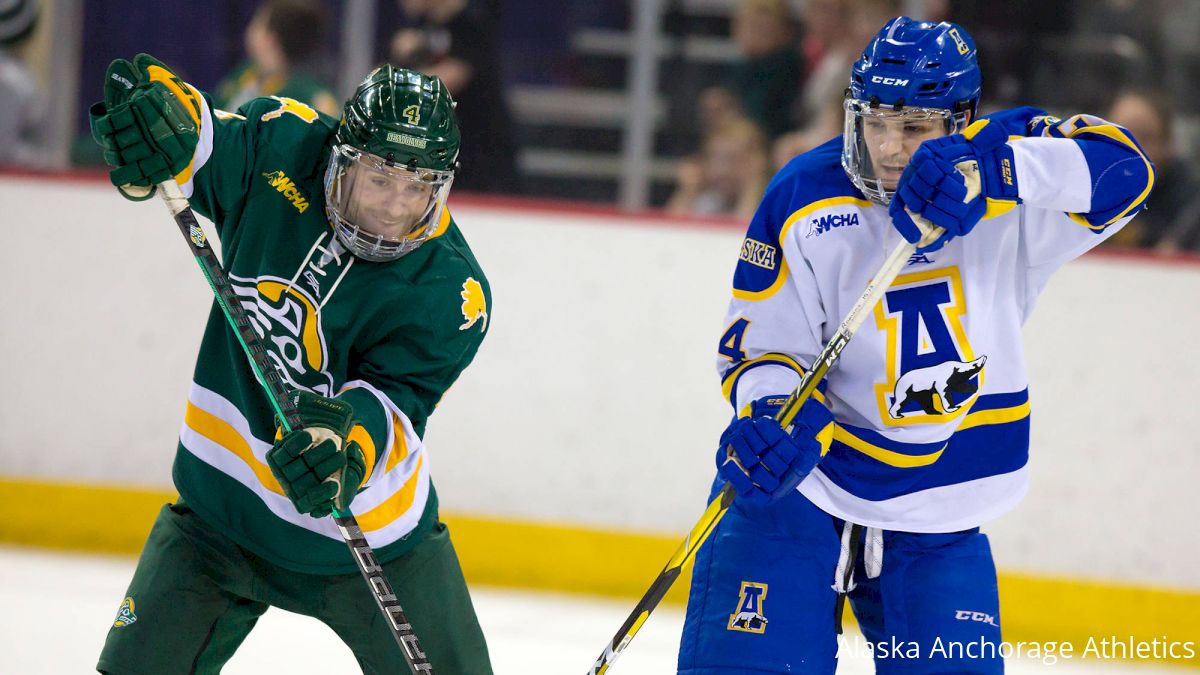Alaska Anchorage In A Precarious Position Heading Into 2019-20
Alaska Anchorage In A Precarious Position Heading Into 2019-20
The college hockey scene in Anchorage is as dark as a day in December.

The college hockey scene in Anchorage is as dark as a day in December. Due to a statewide financial crisis in Alaska, WCHA staffers spent their summer “vacation” scrambling to make two contingency schedules—one with no teams in Alaska, and another for the possibility of a combined team, merging athletes from both Fairbanks and Anchorage. Flights were postponed, plans put on hold, and coaches and athletes spent two months debating their futures.
Finally the reprieve in early August: both teams will play at least one more season, nothing guaranteed after that. Seawolves second-year coach Matt Curley, he of three career wins, speaks like a guy who just dodged the gallows.
“It was a tough summer,” Curley said. “Like we tell the guys—what doesn’t kill you makes you stronger.”
Its program now in jeopardy, one might forget that Seawolves hockey has an impressive history, including a pantheon of big name coaches: Damon Whitten, Don Lucia, and Alaska Hall of Famer Brush Christiansen. Under Christiansen’s 17-year command, Anchorage went from a Division II independent to qualifying for three consecutive NCAA Division I Tournaments in the early 1990s. Back in the day, Seawolves games frequently packed Sullivan Arena with 6,200 fans, college hockey’s version of the Northern Lights.
“Hockey was very big up here,” Christiansen, now an active hunter in his late 80s, said. “We filled the building, which offset the costs.”
The Sullivan Arena era ended this past season, as the Anchorage athletic department moved its home games back on campus. They will now be played in the Seawolf Sports Complex, seating capacity less than 1,000. Sellouts, a fantasy from a distant past, won’t approach the desperately needed revenue threshold to reimburse visiting teams for their travel. Curley finds himself shaking his head at the sequence of events since his arrival last season.
“All this started coming down, it was a bit out of left field,” Curley said. “It has tested our will up here as a staff, certainly for our players.”
But the 36-year-old coach does not flinch when facing adversity, in this case, fighting for survival not only in the WCHA, but within the 49th state. “Hopefully it serves as motivation to prove that we do belong here, whether it’s on the state level or in the league.”
Curley, a man who moved his family to Austria (to take the head coaching job with the EC Red Bulls Juniors team based in Salzburg) to keep his coaching dream alive, has been an active recruiter in his 16 months as a Division I head coach. He’s convinced an impressive array of junior players to relocate to the Last Frontier for what could be a final season, including a 25-goal scorer from the USHL (Rylee St. Onge), two captains from the neighboring BCHL (Nick Wicks and Troy Robillard), and a goalie from the NAHL (Brandon Perrone).
Last season Curley was spied frequently at the rink in Coquitlam, British Columbia, tracking Robillard, a BCHL defenseman who battled through a painful lower body injury. Curley landed his catch, a gutty competitor who will help anchor the Seawolves blue line. “We’re excited about our class,” Curley said, “a nice balance, hopefully making us a little more competitive.”
The story line in Anchorage: a program under fire, guaranteed nothing more than the one season ahead, is reminiscent of classic sports films like Slapshot and Major League.
The motivation brought on by an existential crisis strikes a chord in every fan; how can one not root for the league’s biggest underdog? The Seawolves don’t have to “win the whole thing,” but they will certainly need more than three victories if they are to maintain their existence.
Christiansen, the wise elder of Alaskan hockey, still dreams of creating a new league out west, but none of this happens without getting local hockey fans excited once again. “The city of Anchorage has to support the team,” the man called Brush said. “If you give ’em a reason, they might come.”
Christiansen reminisced on the phone a bit longer, before signing off with a heartfelt request.
“Put some good words in, we’re going to need help.”